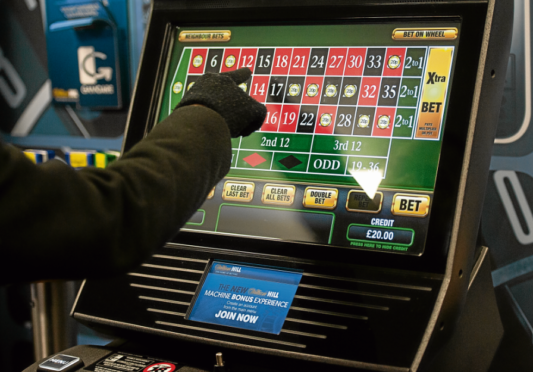Gamblers across the north and north-east have spent more than £114million in controversial casino-style gambling machines in bookmakers across the region in just eight years.
Fixed Odds Betting Terminals (FOBT) allow players to make big bets around every 20 seconds and often mimic the likes of roulette or blackjack.
Statistics from the Campaign for Fairer Gambling estimate that punters in Aberdeen spent more than £63.5million on the machines between 2008 and 2016.
Around £25million of this was estimated to be spent by “problem gamblers”.
In Aberdeenshire the figure is £24,3million, Highland £18million, Moray £7,4million and £1,1m in the Western Isles.
The cumulative total for Scotland was £1,158,085,657 – more than £250,000 a week.
Last month, the UK’s Gambling Commission recommended the the maximum stake for the terminals should be cut to £30 or less from the current £100.
In 2015 Inverurie man Lee Murphy took his own life after amassing more than £30,000 of debt due to his addiction to the machines.
His grieving partner Wendy Bendal has since called for them to be outlawed.
Last night Aberdeen Central SNP MSP Kevin Stewart called on the maximum limit to be lowered to £2- if not banned entirely.
He said: “It is appalling that in eight years over £63 million has been lost on FOBTs in Aberdeen alone.
“Lee (Murphy’s) gambling was centred around FOBTs and his sad death stands as a horrible reminder as to just how devastating these machines can be.”
Alistair MacKinnon chief executive of the Fast Forward youth charity said: “We support the view that the most effective approach to reducing gambling related harms is to take a range of actions , of which lowering the maximum bet on FOBTs would be one.”
A spokesman for the Association of British Bookmakers said: “Betting shops make a significant contribution to the local and national economy and in Aberdeen City and Shire they employ nearly 400 people and pay around £8.5million a year in taxes and business rates.
“Mr Stewart’s call for a £2 stake would put 2,500 staff in Scotland out of work while doing nothing to address problem gambling as customers would simply be displaced to other gambling venues, such as arcades or pubs, that lack our trained staff and industry leading safeguards.”
